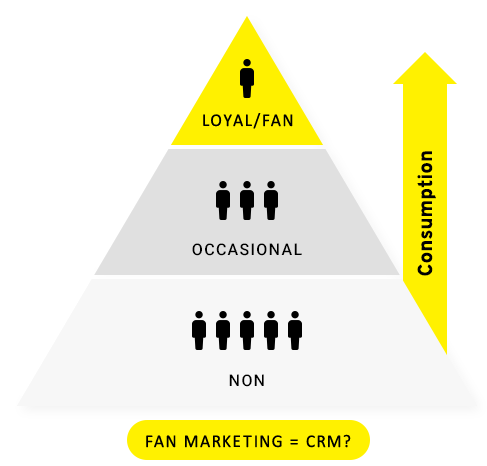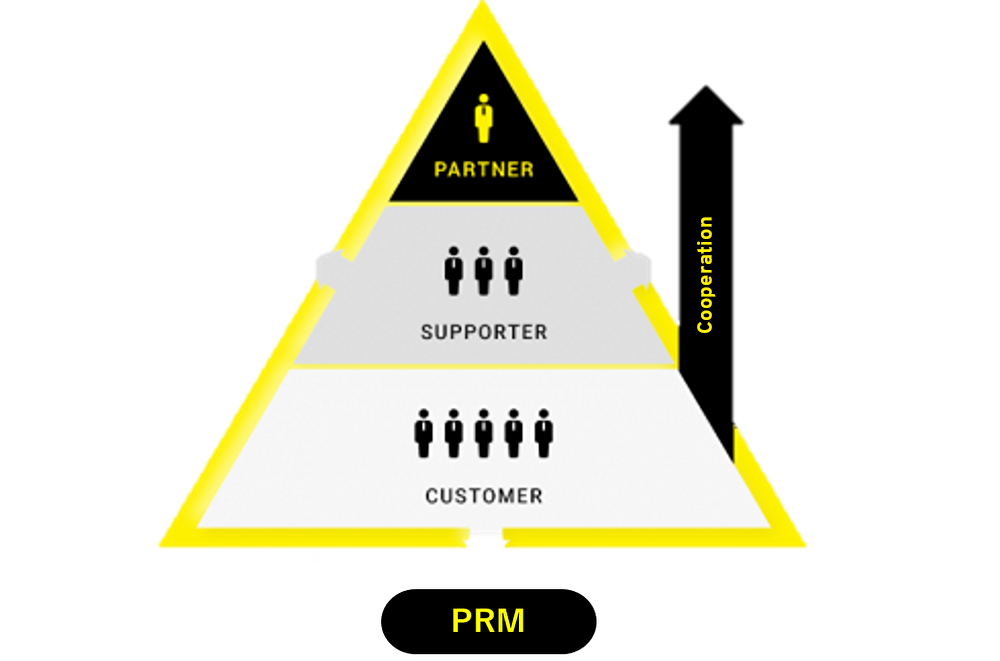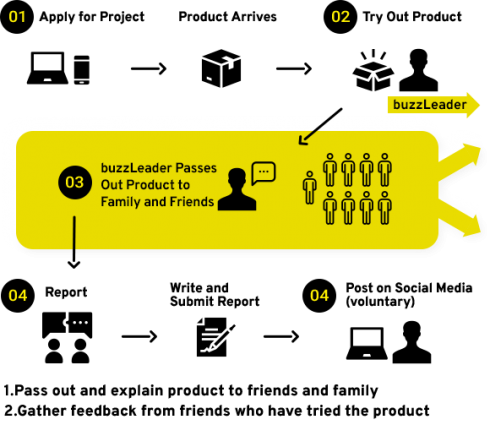There is no silver bullet in marketing. You should approach your fans or your partners.
Today's narrator
 CEO Seiichiro Fujiwara CEO Seiichiro Fujiwara After marketing financial products and establishing a venture capital firm, he founded eLife Inc. 1999. Hobbies include marine sports and snow sports. Dog lover. |
Hello, I am Fujiwara, CEO of eLife Inc.
Our CMO, Maki Sugiyama, previously wrote an article titled "Consumers are partners to the company - a basic concept of eLife Inc.: What is PRM?"
I also received several responses from people who read this column, including one who said, "So, in essence, you're talking about fan marketing, which is all the rage these days, right?" As Sugiyama mentions in her column, I believe that fans and partners, fan marketing, and PRM are not similar. And I think it is very important for a company's marketing activities to recognize the difference and use them correctly.
Therefore, in this article, I decided to discuss the difference between the two again. After that, I hope to reiterate to you why I insist on calling them partners rather than fans.
A global brand that builds intense relationships with its fans
When you hear the word "fan," you probably immediately think of people who root for a particular celebrity, idol, or sports team. Enthusiastic, they embrace everything about the subject they are rooting for. For example, if the target is a sports team, they will continue to support that team whether they win or lose. This is what I imagine a "fan" to be. When asked, "Why do you cheer so much?" I am sure they would not be able to answer. Because there is no other reason than "because I love them" for their actions to support the subject. Yes, there is no reason for love.
Now, "fan marketing" is a recent trend to apply such reasonless enthusiasm and affection to marketing activities of companies and brands.
One of the world's most famous examples of successful fan marketing is Apple Inc. There are indeed enthusiastic fans of who always keep an eye on developments and when a new iPhone is released, they always buy it on the day it goes on sale without comparing it with other products. Other brands such as the sports brand Nike or the Japanese brands PlayStation and Nintendo Co., Ltd. have fans all over the world. Our partner company MUJI, discussed in a previous column, is another good example of a brand that has formed a close relationship with its fans through unexplained enthusiasm and love.

Fans will bring fans to you, is that a misconception?

These success stories show that there is no doubt about the "disruptive power" of good fan marketing. No wonder companies are jumping on the bandwagon. At the same time, however, I believe that there is a certain misconception that lurks in all this fan marketing talk. Again, there is no reason for fan behavior. Fans buy a certain product because they "like" the product or brand (for no particular reason that can be explained). Such people will, in the extreme, buy the brand's products repeatedly even if they are left alone. However, whether they are willing to recommend the brand to others is a different story.
For example, a person who is passionately in love with a certain sports team would not recommend that his or her acquaintances, who are not particularly interested in that sport, support the team. Since "there is no reason for love," there is no way to make a persuasive recommendation. So, in the end, what is called "fan marketing" is simply an approach to those who buy a lot of your products to encourage them to buy more of them.
This means that it may be little different from what has been called "loyal customers," "CRM," etc.
It is my contention that such an approach to "fans" is not consistent with the objective if one expects to expand the circle of people who buy through word-of-mouth and other means.
There is a reason for everything your partner does

Our term "partner" is not the same as "fan."
In some cases, the partner may be fanatical about the brand, but he or she does not necessarily have to be fanatical or love it. And while fans don't have reasons for liking something, all of our partners have reasons for their actions. For example, the partners who are active on our platform "buzzLife" are not doing so because they have a love for the product or brand. Some benefit from receiving free product samples. Some seek the satisfaction of fulfillment and recognition that comes from participating in marketing projects. Others are attracted to the idea that their opinions will be reflected in product development and that the products they want will be released to the market.
Although the reasons for this vary from person to person, the relationship is more meritorious and business-like than that with fans. We call it a "win-win relationship" or "co-creation." Unlike fans, these people will recommend a product to others even if it is not suitable for them, on the grounds that it might be suitable for that person. If they feel that this will satisfy their own need for approval or provide them with something in return, they will act in such a way. As a result, word of mouth spreads, even if it is gratuitous, which is what we call the "PRM" mechanism.

eLifeHow the platform " buzzLife" operated by
Recognize the differences and choose the method that best suits your objectives

One of the most successful examples of fan marketing is Nike, Inc., which is known for expressing its stance on sensitive topics such as black racism and misogyny in a fairly clear manner. Consumers who have preferred to purchase Nike, Inc. products in the past naturally include a significant number of people who disagree with the stances expressed by Nike, Inc. There is a risk that such consumers will be turned off by a company expressing its political stance, and will leave. In fact, this seems to be happening around Nike, Inc. However, Nike, Inc. is willing to take that risk. They are aware of the risk and dare to express their political stance. Why is this?
In my opinion, by doing so, they are trying to create a clearer "personality" for the Nike brand. In this way, they are trying to deepen their relationship with only those fans who truly share their worldview. Fan marketing with its strong "destructive power" is the result of this process. In other words, it demands a great deal of commitment from the company.
Let me be clear, I am not trying to say that the PRM system is superior to fan marketing. The key is to properly recognize the difference between fans and partners and to choose the method that best suits our goals. And again, to truly go through with fan marketing, a great deal of determination is required. If that is the case, I would like to tell you that PRM may be well worth considering as a realistic method for many Japanese manufacturers to obtain results.



